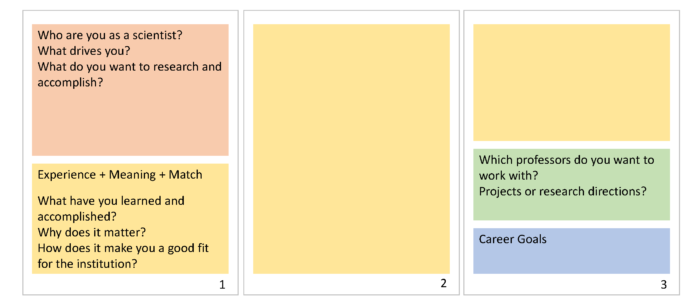Criteria for Success
- Your personal statement convinces a faculty committee that you are qualified for their program.
- It convinces them that you a good fit for their program’s focus and goals.
- You show a select group of skills and experiences that convey your scientific accomplishments and interests.
- Your experiences are concrete and quantitative.
- Your personal statement is no more than 3 pages.
Structure Diagram

Purpose
The graduate school personal statement tells your story and demonstrates that you are a good match for a particular department or program. Matching goes both ways: they should be interested in you, and you should be interested in them. Your personal statement should make this match clear.
Analyze Your Audience
Your personal statement will be ready by a graduate committee, a handful of faculty from your program. They’re trying to determine if you will be a successful graduate student in their department, a positive force in the department’s intellectual life, and a successful scientist after you graduate. They are therefore interested in your qualifications as a researcher, your career goals, and how your personality matches their labs and department.
The graduate committee probably reads hundreds of applications a year. To make it easy for them to figure out that you are a good fit, make direct, concrete statements about your accomplishments and qualifications. To make it easy for them to remember you, create a narrative that “brands” you.
Skills
Create a personal narrative
PhD programs invest in the professional and scientific growth of their students. Get the committee excited about investing in you by opening your essay with a brief portrait of what drives you as a scientist. What research directions are you passionate about, and why? What do you picture yourself doing in 10 years?
Close your essay with a 2-3 sentence discussion of your career interests. No one will hold you to this; this just helps your committee visualize your potential trajectory.
Describe your experiences
Experiences are the “what” of your essay. What experiences led you to develop your skill set and passions? Where have you demonstrated accomplishment, leadership, and collaboration? Include research, teaching, and relevant extracurriculars. State concrete achievements and outcomes like awards, discoveries, or publications.
Quantify your experiences to show concrete impact. How many people were on your team? How many protocols did you develop? How many people were in competition for an award? As a TA, how often did you meet with your students?
Describe actions, not just changes in your internal mental or emotional state. A personal statement is a way to make a narrative out of your CV. It is not a diary entry.
| Vague experience | Concrete experience |
| During this project, my mind was opened to the possibility of using different programming languages together to create code that is faster to run and easier to understand and modify. | During this project, I collaborated with other group members to develop a user-friendly Python wrapper for a 10,000-line Fortran library. |
| I showed initiative in my second project in the lab. | Frustrated with the direction of my first project, I consulted with other faculty and proposed an entirely new project. |
| During my first year, I became a more curious and capable scientist. | I explored the literature and proposed two alternative procedures to make the experiment efficient. |
| I won the physic department’s Laser Focus prize. | I won the physics department’s prize for top student among my cohort of 20 students. |
| I learned about the role of enzymes in cancer. | I quantified the kinetics of three enzymes implicated in cancer onset. |
Explain the meaning of your experiences
Meaning is the “why” or “so what” of the document. Why was this experience important to your growth as a scientist? What does it say about your abilities and potential? It feels obvious to you, but you need to be explicit with your audience. Your descriptions of meaning should also act as transition statements between experiences: try to “wrap” meaning around your experiences.
| Experience only | Experience and Meaning |
|
|
Demonstrate match to your target program
Demonstrate an understanding of the program to which you’re applying and about how you will be successful in that program. To do this:
- Read the program’s website. See what language they use to describe themselves, and echo that language in your essay. For example, MIT Chemical Engineering’s website points out innovative research areas and interdisciplinary opportunities.
- Get in contact with faculty (or students) in your target program. If you have had a positive discussion with someone at the department, describe how those interactions made you think that you and the department may be well-matched.
- State which professors in the program you would be interested in working with. Show how their research areas align with your background and your goals. You can even describe potential research directions or projects.

